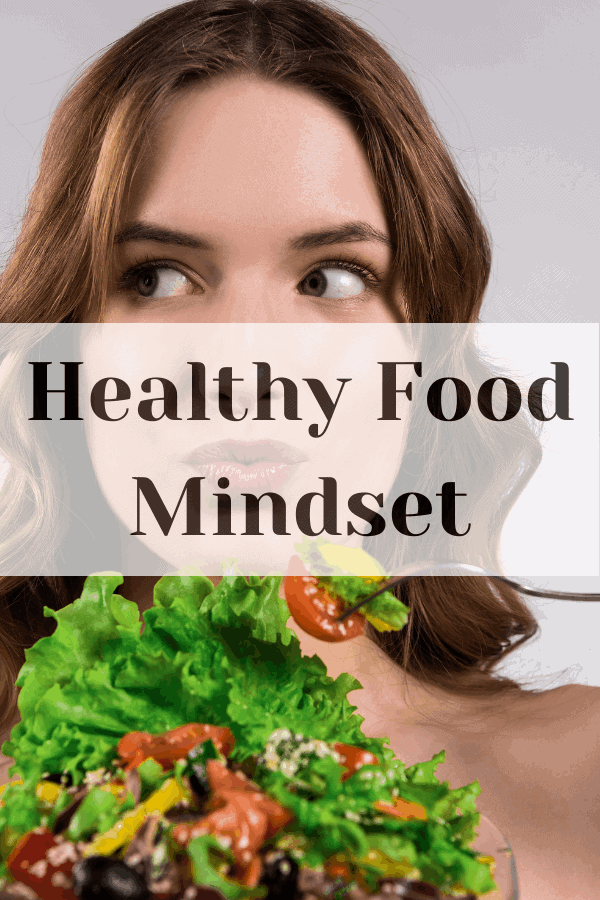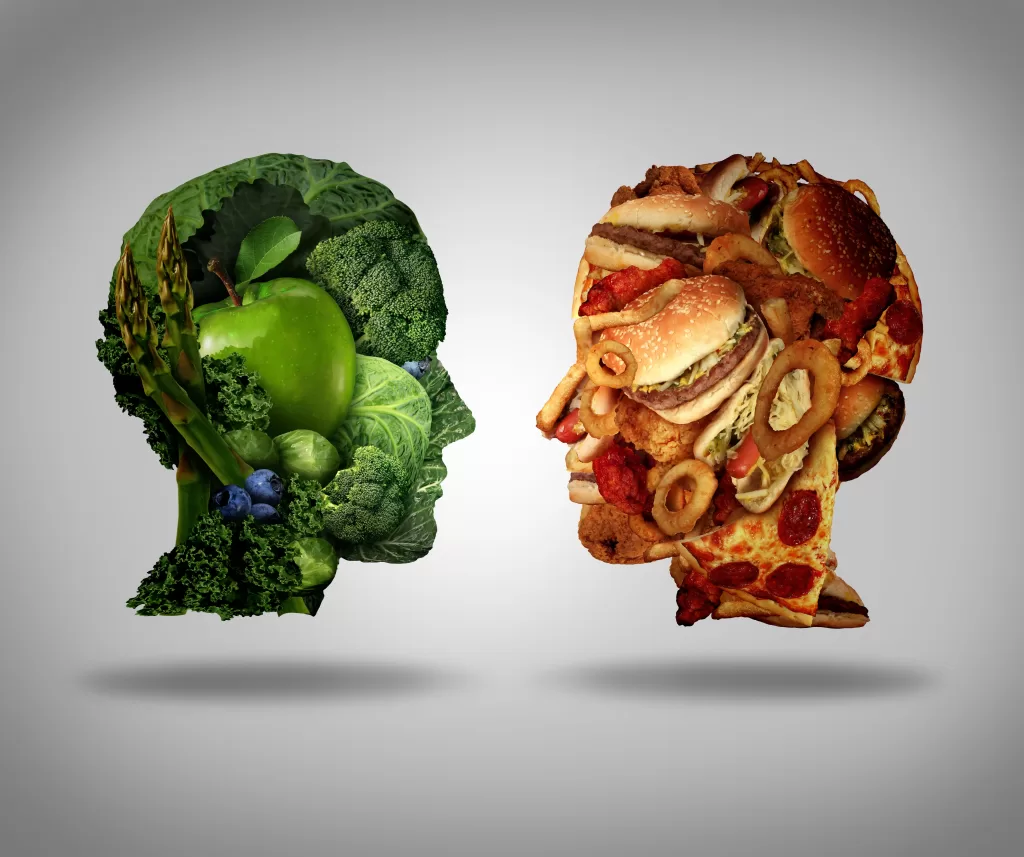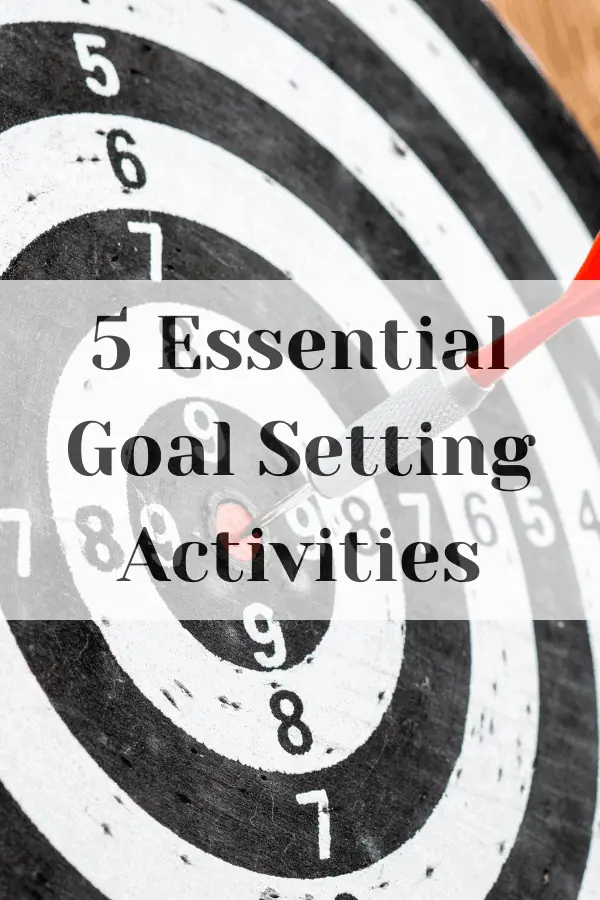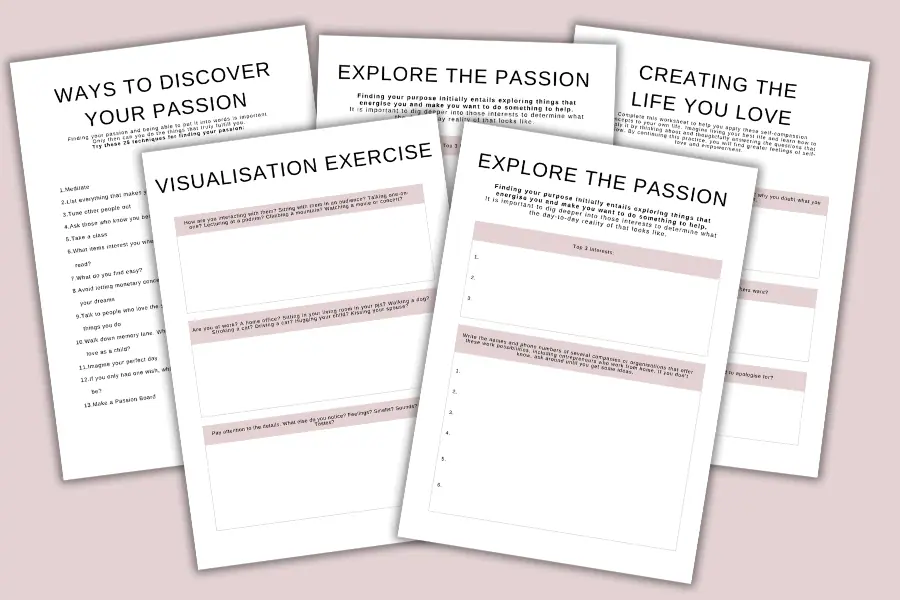Healthy Food Mindset

Developing a healthy food mindset can play a critical role in your weight loss journey, or if you want a better relationship with food.
In this post, we are going to explore how you can improve your food mindset to be more positive.
This post is about a healthy food mindset

The Importance of Mindset
Your mindset plays a crucial role in your ability to make healthy food choices and develop a positive relationship with food. If you have a negative mindset, you may feel guilty or ashamed about certain foods, or you may approach healthy eating with a restrictive, all-or-nothing mentality. This can lead to feelings of deprivation and frustration.
On the other hand, if you have a positive mindset, you may feel more motivated and empowered to make healthy choices. A positive mindset can help you overcome challenges and setbacks, and it can make healthy eating feel like a sustainable and enjoyable part of your life.
To develop a positive mindset when it comes to food, it’s important to focus on progress, not perfection. This means celebrating small victories along the way, such as making healthier choices or trying new foods. It also means reframing negative thoughts and practising self-compassion, rather than beating yourself up over occasional indulgences or slip-ups.
In addition, it can be helpful to focus on the positive aspects of healthy eating, such as the benefits it provides for your body and overall well-being, rather than feeling like you’re giving up something or restricting yourself. This can help you approach healthy eating with a sense of abundance, rather than scarcity.
By cultivating a positive mindset when it comes to food, you can develop a healthier relationship with food and make sustainable choices that support your overall health and well-being.
Whole Foods vs Processed Foods
Whole, nutrient-dense foods are an essential part of a healthy diet, as they provide your body with the vitamins and minerals it needs to function properly. In contrast, heavily processed foods often contain high amounts of added sugars, sodium, and unhealthy fats.
When you choose whole foods over heavily processed options, you’re providing your body with the best possible fuel. This can help you feel more energised, improve your mood, and support your overall health and well-being. Here are some tips for incorporating more whole foods into your diet:
Choose a variety of colourful fruits and vegetables
Different coloured fruits and vegetables provide different nutrients, so aim for a rainbow of colours on your plate. This can help ensure that you’re getting a wide range of vitamins, minerals, and antioxidants.
Opt for lean proteins
Choose lean protein sources such as chicken, fish, beans, and tofu. Limit your intake of processed meats and high-fat meats.
Swap processed snacks for whole food options
Instead of reaching for crips, sweets or other heavily processed snacks, try snacking on fresh fruit, veggies and hummus.
Make your own meals
Cooking your own meals can help you incorporate more whole foods into your diet, as you have more control over the ingredients you use. Experiment with new recipes and try to make cooking a fun and enjoyable experience.
Choosing whole foods over heavily processed options is an essential part of a healthy food mindset. This can help provide your body with the nutrients it needs to function at its best. By incorporating more whole foods into your diet, you can support your overall health and well-being, and develop a positive relationship with food.
Mindful Eating for Healthy Food Mindset
Mindful eating is a practice that involves paying attention to your food and your body while you eat, without distractions such as TV, phones or books.
It’s an important aspect of developing a healthy food mindset, as it can help you become more attuned to your body’s hunger and fullness signals, and develop a greater appreciation for the food you eat. Here are some tips for practising mindful eating:
Eat without distractions
Turn off the TV, put away your phone and any other distractions, and focus on your food.
Slow down and savour each bite
Take the time to really taste and appreciate the flavours and textures of your food.
Check-in with your hunger and fullness
Before you start eating, check in with your body to see how hungry you are, and during the meal, pause occasionally to assess your level of fullness.
Listen to your body’s cues
Eat when you’re hungry, and stop eating when you’re satisfied or full.
Be present and non-judgmental
Approach your eating with curiosity and an open mind, and avoid judging yourself or your food choices.
Practice gratitude
Take a moment before you eat to express gratitude for the food on your plate and the people who made it possible.
By practising mindful eating, you can develop a greater awareness of your body’s hunger and fullness signals. This can help you make healthier food choices, avoid overeating, and develop a more positive relationship with food.
The Dangers of Restrictive Diets
Restrictive diets are those that severely limit the types or amounts of food you can eat. Examples include low-calorie diets, diets that eliminate entire food groups, and diets that require strict adherence to specific eating patterns or timing.
While they may initially lead to weight loss, they can also have negative effects on your health and well-being, both physically and mentally. Here are some of the dangers of restrictive diets:
Nutrient deficiencies
Limiting certain foods or food groups can lead to nutrient deficiencies, which can affect your immune system, energy levels, and overall health.
Slowed metabolism
Very low-calorie diets can cause your body to slow down its metabolism in an effort to conserve energy, making it more difficult to lose weight in the long term.
Negative psychological effects
They can also have negative psychological effects, such as feelings of guilt or shame around food, anxiety and stress, and preoccupation with food and weight.
Unsustainable
Most restrictive diets are difficult to maintain in the long term, leading to weight regain and a cycle of yo-yo dieting.
Instead of following restrictive diets, focus on adopting a balanced, healthy eating pattern that includes a variety of whole foods in appropriate portions. This can help you meet your nutrient needs, maintain a healthy weight, and develop a positive relationship with food. It’s also important to listen to your body’s hunger and fullness signals and to avoid labelling foods as “good” or “bad” or putting strict rules on what you can and cannot eat. By adopting a flexible, balanced approach to eating, you can support your overall health and well-being.

Finding Balance
Finding balance is a key aspect of developing a healthy food mindset. It involves adopting an approach to eating that is flexible, realistic, and sustainable, rather than following strict rules or depriving yourself of the foods you enjoy.
Focus on whole, nutrient-dense foods
Base your meals around whole foods like fruits, vegetables, whole grains, lean proteins, and healthy fats. These foods are rich in nutrients that support your overall health and well-being.
Allow for flexibility
It’s okay to enjoy your favourite foods in moderation. Allow yourself to indulge in your favourite treats on occasion, without guilt or shame.
Listen to your body
Pay attention to your body’s hunger and fullness signals, and eat when you’re hungry and stop when you’re satisfied. This can help you avoid overeating and make more mindful food choices.
Practice mindful eating
As discussed earlier, mindful eating involves paying attention to your food and your body while you eat, without distractions. This can help you develop a greater appreciation for your food and become more attuned to your body’s needs.
Avoid labelling food as “good” or “bad”
All foods can have a place in a healthy diet, and labelling foods as “good” or “bad” can create a sense of guilt or shame around eating. Instead, focus on making balanced choices that support your overall health and well-being.
Seek support
It can be helpful to seek support from a registered dietitian or a mental health professional if you’re struggling to find balance in your eating habits. They can help you develop a personalised approach to eating that works for you and your lifestyle.
By finding balance in your eating habits, you can support your overall health and well-being, both physically and mentally. Remember that there is no one-size-fits-all approach to healthy eating and that it’s okay to experiment and find what works best for you.
Overcoming negative self-talk
Negative self-talk can be a major obstacle to developing a healthy food mindset. It can lead to feelings of guilt, shame, and anxiety around food, and can make it difficult to make positive changes to your eating habits. Here are some tips for overcoming negative self-talk:
Identify your negative thoughts
Pay attention to the thoughts you have about food and your body. Are they positive or negative? Are there certain triggers that lead to negative thoughts? Once you’ve identified your negative thoughts, you can start to challenge them.
Challenge your negative thoughts
When you notice a negative thought, ask yourself if it’s really true. Is there evidence to support it? Are there alternative ways of thinking about the situation? Challenge your negative thoughts with more positive, balanced ones.
Practice self-compassion
Treat yourself with kindness and understanding, rather than judgment and criticism. Remember that nobody is perfect and that making mistakes is a normal part of the learning process.
Reframe your goals
Instead of focusing on weight loss or restrictive eating patterns, focus on positive goals that support your overall health and well-being.
Seek support
It can be helpful to seek support from a therapist or a registered dietitian if you’re struggling with negative self-talk around food and your body. They can help you develop coping strategies and a more positive mindset.
By overcoming negative self-talk, you can develop a more positive relationship with food and your body. Remember that changing your mindset takes time and practice and that small steps can lead to big changes over time.
Using Social Media Mindfully
Social media can be a powerful tool for connecting with others and finding inspiration, but it can also be a source of stress and anxiety when it comes to food and body image. Here are some tips for using social media mindfully:
Curate your feed
Be mindful of the accounts you follow on social media, and unfollow any that make you feel bad about yourself or your body. Instead, focus on following accounts that promote positivity, balance, and body acceptance.
Take breaks
It’s okay to take a break from social media when you need to. If you find yourself feeling overwhelmed or triggered by what you see on social media, take a step back and focus on other activities that bring you joy and relaxation.
Engage mindfully
When using social media, try to engage mindfully by paying attention to your thoughts and feelings as you scroll through your feed. If you notice negative thoughts or feelings coming up, take a moment to reflect on them and consider how you can respond in a more positive way.
Be aware of filters and edits
Social media is full of filters and edits that can create an unrealistic and unattainable image of beauty. Remember that what you see on social media is often curated and edited and that real bodies come in all shapes and sizes.
Use social media for inspiration
Instead of comparing yourself to others on social media, use it as a source of inspiration for positive changes in your life. Follow accounts that promote healthy, balanced eating and exercise habits, and use their ideas to inform your own healthy food mindset.
By using social media mindfully, you can cultivate a more positive relationship with your body and your food choices. Use social media as a tool for inspiration and connection rather than comparison and judgment.
Practice Intuitive Eating
Intuitive eating is an approach to eating that involves tuning into your body’s natural hunger and fullness cues. Here are some tips for practising intuitive eating:
Listen to your body
Pay attention to your body’s hunger and fullness signals, and eat when you’re hungry and stop when you’re full. Don’t ignore your hunger cues or eat past the point of fullness.
Give yourself permission to eat
Give yourself permission to eat all foods without guilt or shame. By removing the stigma from certain foods, you can reduce the likelihood of binge eating or overeating.
Practice mindful eating
Engage your senses when you eat, and savour the taste, texture, and aroma of your food. This can help you stay present in the moment and enjoy your food more fully.
Reject diet culture
Intuitive eating involves rejecting the diet culture that promotes rigid food rules, weight loss, and body shaming. Instead, focus on cultivating a positive and accepting relationship with your body.
Seek support
If you’re struggling with intuitive eating, seek support from a registered dietitian or a therapist who specialises in eating disorders. They can help you develop strategies for listening to your body and practising intuitive eating.
By practising intuitive eating, you can develop a more positive relationship with food and your body, reduce the likelihood of binge eating or overeating, and cultivate a sense of mindfulness and pleasure around eating. Remember that intuitive eating is a process and that it takes time and practice to tune into your body’s natural cues and develop a healthy food mindset.
This post was about a healthy food mindset
Share this post: on Twitter on Facebook



